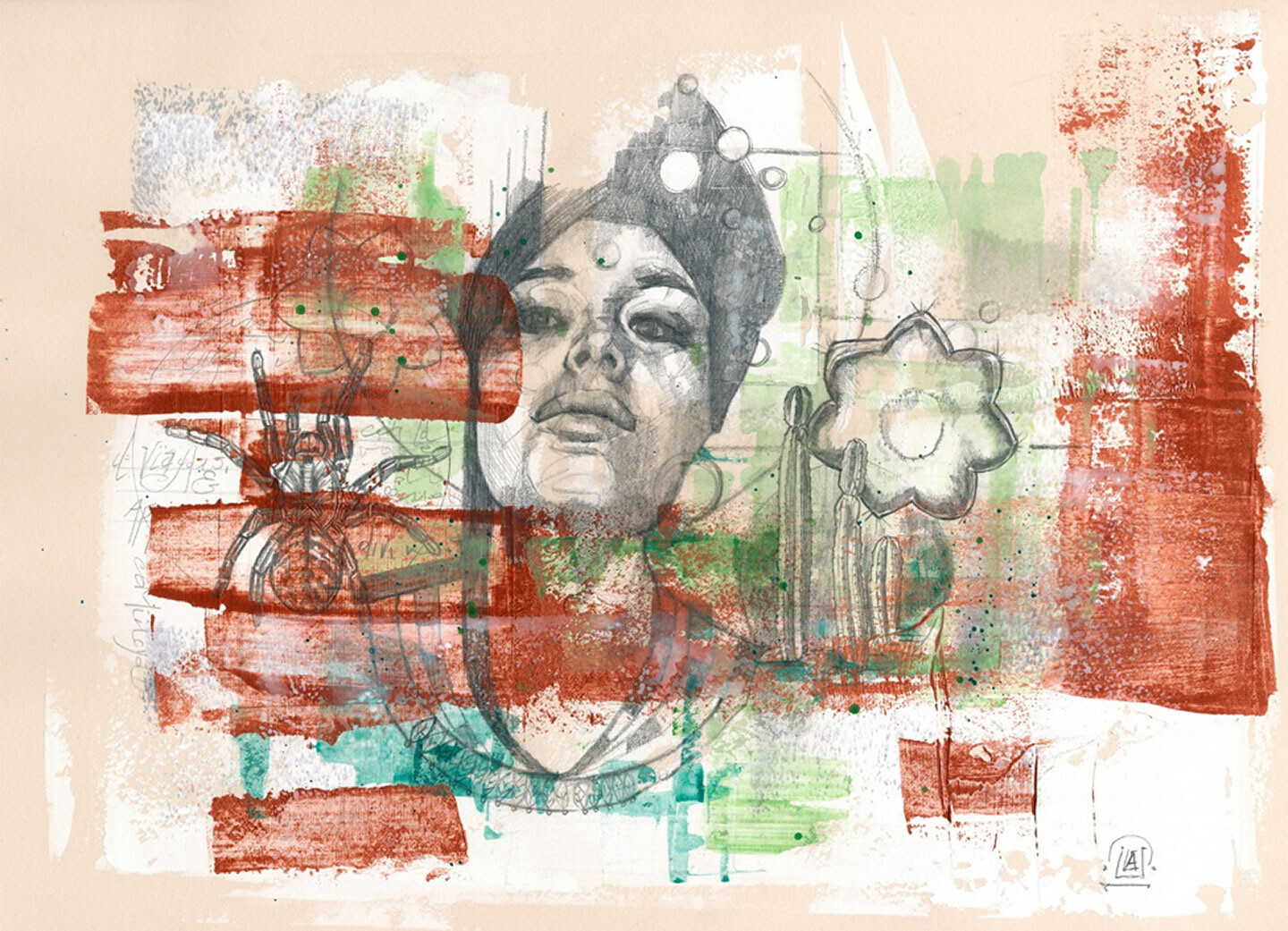In the House of the Everpresent
He reached Metropical by late morning. He had the entire afternoon at his disposal, and he wanted to spend it in the pavilions of the House of the Everpresent. According to House philosophy, Federica was not buried. She was paused, or preserved.
The word “preserved” made Isidoro think of colorful boxes in a sad supermarket. The idea of being “paused” was like saying she was waiting—but waiting for what? A change of her state of matter? The trumpets of the Resurrection? For a man like him, distanced from any religious feeling, those linguistic formulas had the false ring of consolation. Paula had wanted to entrust the remains of their daughter to this eccentric New Age cemetery, which was very costly.
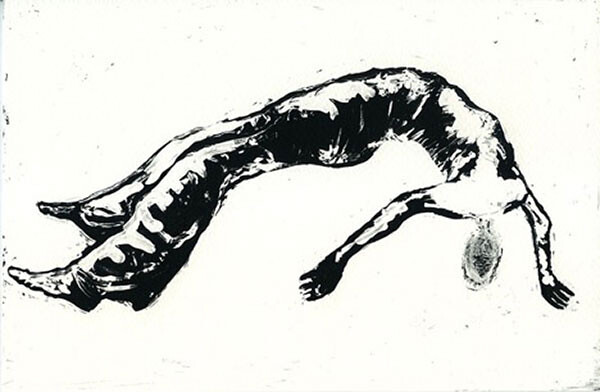

Illustration by Flavio Marziano.
The entrance to the House of the Everpresent seems like an azure lounge bar. A massive, translucent Persian blue dome filters dreamy turquoise light. The light is uniform, its source untraceable. It is motionless and mineralized and forms a sort of hill at the center of the entrance hall. You could even get lost inside it. Music more delicate than silence accompanies your footsteps, melancholic visitor in search of the slab that conceals one of the many eternities. All around, pitifully, phosphorescent epigraphs say the opposite of the truth. Isidoro looked around to survey the space and let his eyes get used to the half-light between the rows of dark marble slabs. Beside them were small hemispheric booths on three floors. He climbed to the second floor of the East wing, headed to Row 74, and recognized from a distance the hologram emblem of Federica, turning her face towards him with a slight smile.
Once he entered the booth, Isidoro sat on the wooden bench and the screen immediately lit up on the wall across from him. The Cells of the Everpresent had curved screens across which the lives of the departed ran nonstop. On the concave back wall runs a trembling, electronic afterlife. Ectoplasms of the past are continually rearranged by grabbing brief fragments of video recordings from the prior existence, and combining them with clips from the present. Friends and relatives are televised, sending in images where they recollect the one lying beneath.
Probabilistic Conversation
In the nine months following his daughter’s death, Isidoro had tried to hide from himself the senseless void of the event. He hadn’t asked questions, he hadn’t tried to understand. But now he would have liked to be able to ask her, “What happened to you, my girl, my little bat pup? What happened to you in the final months of your life, when I wasn’t there to protect you?”
The flow of images across the screen in the Remembrance Booth could not answer his questions. There were mysterious and disturbing frames, whose meanings Isidoro could not understand. He wanted to go beyond the images and know more, divine something, speak with her as though she were really there. He decided to use the probabilistic conversation device. In the nine months that had already passed since her death, he had never accepted the idea of speaking to that frozen hypothetical construct of his daughter. But this time he needed to. He set up the system. He formulated a question, the first one that came to his mind. It wasn’t a specific question; it was the vaguest, most unanswerable one.
“Were you ever happy?” he asked, typing on the keyboard and awaiting a reply.
The automatic responder took about ten seconds, examining thousands of interpretable utterances. It searched the archives of the dead woman’s memory, processed the general meaning of her speech, and then, in her voice, it reacted in the only way possible: with a disconnected stream of memories and feelings.
“I’m beautiful. Everyone says so. I let people touch me hoping that someone will find me …”
I was afraid of myself. I made the noise of an object. Inside of me was the metaphysical solitude of objects. I run along all the concatenations. I am every one of them. Every me every you every all of you every pronoun. And I like to be you.
Every node is aware of every other one. In every moment. And even of the fish flopping in the net.
“My first date with Luca, the one who made me happy and who made me eternally unhappy. His voice on the phone had a very professional tone. He said that he’d read my thesis on grace and he wanted to talk about it. He suggested we meet at the Green Bar where there was a Beckett Marathon and he lent his voice to the final rumblings of The Unnameable. Then, silence.
I wanted to follow him to his apartment. Zones of chaos alternating with flashes of maniacal order. I kept the nape of my neck in the hollow between his knees. I looked up. With his speech he slowed down the flow of things. His shirt was open. We started talking as though we could have stopped if we’d wanted to. Precisely because we look for a way to quiet things, the conversation continues. Nevertheless, I’m scared. Scared of what his words will do to me. His voice was calm and milky. Certain syllables pushed air forwards, others sucked it in. Still others stopped, pulsating. They melted. They trickled. They smelled of cinnamon. I shivered.
I was drowning in a flood of words. “Our world is nothing but a dense shadow rippled by words and I can modify it by pulling the right strings. Open chasms wide and fall into them, or build myself bridges to cross them.”
To Luca everything was a flood of associations. A merciless association machine.
“I am crouched down in a corner of my body. Your voice resounds in me as though inside a hollow statue.
Enormous.
Thoughts roll around my head dragging it from one place to another.
The gaze of a tightrope walker without a net.
I am late even for appointments that were never made. Everything I touch I transform into pain.”
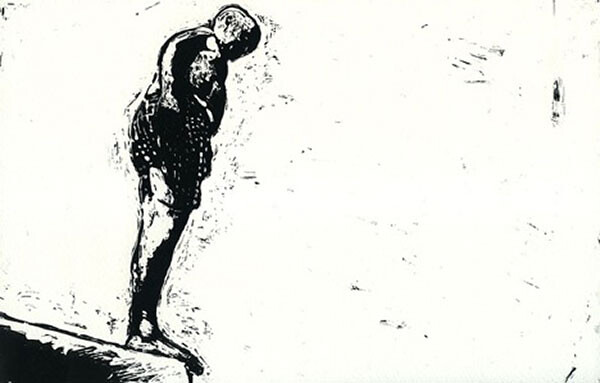

The Future Never Ends
He was looking for the words to ask her if Federica was his daughter. But Paula got there first.
“Maybe it’s better if I go,” she said. “While we’re talking, the sun is getting older. And I can’t possibly help you in any way, Isidoro. No one can help anyone, don’t you see? Your problem is you don’t know how to do anything but think about the past. A person who is determined to dig in the past will only wind up falling into it. And they won’t be able to come back out, even dragging themselves by the elbows. I’m not interested in the past. I want to think about the future.”
“The future?” stammered Isidoro. “What are you talking about? Do you not understand that our biological existence has reached its final chapter? Don’t you see that entropy has seized our neurons, and it’s making the world crumble?”
He had struck a nerve. For a moment, Paula was quiet. Then she pulled herself up and hissed angrily, “The future never ends.”
As Paula walked away stiffly, an unforeseen, infernal abyss of the future opened in front of Isidoro Vitale. Beyond the large windows, the city had plunged into darkness. Now he could see the distant towers of the Allegorical Orphanage, which were slowly leaning to the left.
Paula’s last sentence echoed in his ears the whole night.
The future does not end. Does not end. Does not end.
Nothing ever happens, but everything continues to happen.
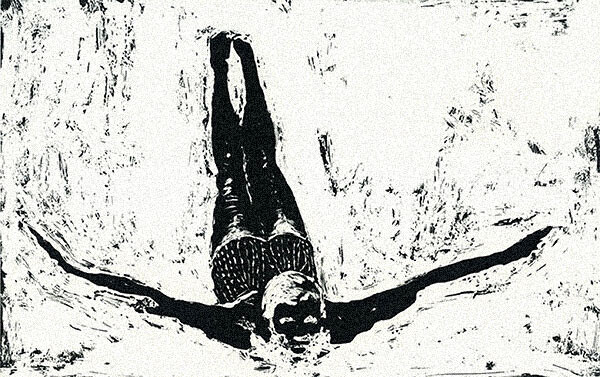

He wanted to leave Metropical as soon as possible, and return to Martina. That was the only thought that relaxed him a little. He thought about the Borgosano mall, where they had met before all of this happened. Before the lid blew off and all the evil sprayed out and invaded the world.
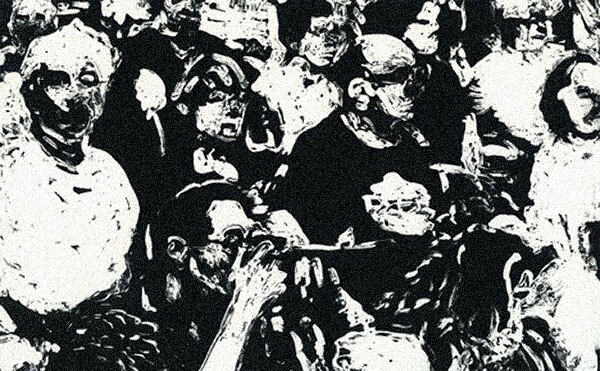

Lucid Coma
It is a time of immobile gulls in the sky nailed to the freezing blue their beaks opened and empty and it is a time of dusty ruins. You must listen to the song of the seismographs that trace disconnected lines on temples sobbing thoughts under stroboscopic light that prevents seizing the passageways and always strikes you in between poses and hides the beginnings and the ends, the naked fissures of the eyes. You embrace the toilet to vomit and someone is above you stroking your forehead and kissing it and soon after you get lost in the rows of cars in the garage rows of pills on the pillow and the high and low points of the sine wave of the coma climb and slide down until a clang of thought a piercing fibrillation that leaves you breathless grips your arm and shoves you and you’re on the cold blue floor with the shrieks of gulls lacerating your conscience and an unprovable theorem on your face.
I was sitting on the Miss Blanche chair,1 its rose petals immobilized in coagulated transparency. No shape, all gesture. Matter is transcended, there is only my body floating in the air, among the petals.
Federica’s house is all luminous transparency, liquid shapes. Even the wardrobes are made of acrylic. The function of concealment is overturned by a casual display. In the living room, a couch by Sturm und Plastic.2 The bookshelves, the dining table, everything transparent. No shelter on which to fix your gaze.
Litracon walls, made of concrete shot through with millions of optical fibers that let light filter in, decomposing it into an infinity of luminous points. Federica’s body behind it, in her room, slides, springs, and imitates existence, like in a shadow play.
In that room, I conceived the algorithms of psychoconnection. Projected at a fractal screen saver’s center, bilious fragments of offal are divined. Liters of neurotic plasma. Cortical networks traversed by electronic liquids to produce extra-synaptic connections, white spinal fluid, lukewarm ejaculations of myelin. Dendritic trees sizzle, armies of axons stand at attention.
I saw air turbulence coagulate in human form, figures that moved only at the edges of my field of vision and spoke in faint whispers.
They rustled in my electric head charring my thoughts as though they were insects. The same stubborn insects that had taken my life by storm, attacking it obstinately from below. They tore off a piece at a time, unraveled it and covered it with their acids, venomous juices that melt your legs. The numbers trickled in dense streams on the monitor, forming hexadecimal puddles. For hours, I stared at the screen’s icy blue discharge with a heart of amethyst at the center.
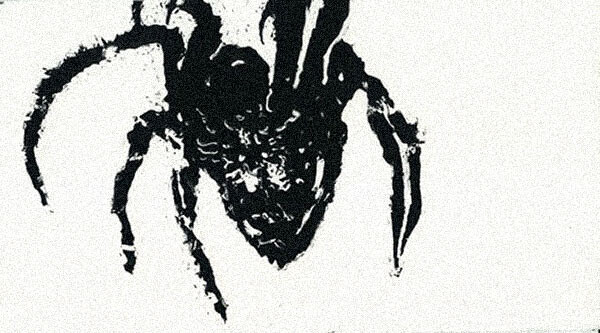

The People of the Sacred Waterfalls
Yonder, a blanket of clouds cloaks the Upper Amazon Basin flowing towards the West—where it collides with the cordillera of Ecuadorian Andes, icy waters flow down the mountains into the misty forest, beyond a tangle of difficult rapids, and where the rivers finally begin to wind in a more placid way—is the home of the Shuar people. They are the People of the Sacred Waterfalls, those liquid bulwarks that have protected them for millennia from their enemies. And they have had plenty of enemies.
In the early sixteenth century, just before the arrival of the conquistadores, the Inca emperor Huayna Capac had tried to subjugate the region. He was forced into an undignified retreat, and declared the Shuar unworthy of being his subjects.
In 1549, a few years after the death of Pizarro, a Spanish expedition came down from the source of the Upano River to its confluence with the Paute River and declared the region of the Shuar too inhospitable and its inhabitants too hostile and savage (jíbaros) to merit their attention.
Moved by avarice, the Spanish managed nonetheless to found there some years later a citadel, at some distance from the Shuar. This functioned until the Revolution of 1599, when the bellicose people decimated them, chasing them away for two centuries to come.
The governor was captured the first night, bound hand and foot, his mouth propped open with a bone, and fed to death with gold nuggets.
An apacï woman, who looked as white as the Spaniards to their eyes, was unworthy of becoming a shaman and would never acquire the arútma wakán, the spirits that would make her invincible, the powers through which to shape reality.
But Hilmegard was determined, and knew that in those impassable canyons she would be able to complete her training. The time she had spent with Marina Solos had earned her the esteem of the Unión Chamánica, which confederated shamans all the way from Alaskan ice to Tierra del Fuego. The Shuar had joined reluctantly, even though they understood it was the only way to save themselves from extinction. They could not, then, oppose the unwanted visit of that woman.
Hilmegard was put up near the cabin of Entsákua (“boiling river”), who lived with his mother’s clan, composed of 26 family members. With her haughtiness and her indisputable ability to travel in the realm of the dead and in infinite cosmic frequencies, Hilmegard was accepted in just a few weeks.
She stayed with the women to ferment manioc roots to extract for beer, or she took care of the vegetable garden or the little ones. Until one night, when Entsákua returned from a hunt, and said solemnly, “We’re ready.” The next day they would set out in the forest.
It took two days of machetes to reach a reddish bank where the river tied itself in a knot like the coils of an anaconda. The forest was alive, swollen, sexual. Swollen with clamor, rumbling, and endless chirping. Hilmegard was stripped naked and immersed in the water, in a recollection of amniotic fluid and birth.
And she was left alone for three days.
The mothers had given her a wet bolus of manioc, as big as the head of a newborn, for her journey in the forest. She would peel away its wrapper of leaves and eat it slowly, starting on the early morning of the second day. As for the rest, there was water all around, there was even too much of the green tobacco infusion, and two terracotta bottles which contained the sacred hallucinogenic brews that were full enough to surely convince some arútma wakán to appear.
The mothers had revealed the secret names of the mixtures to her, without telling her too much about the recipes. Hilmegard knew well that one of them contained ayahuasca. In those regions, they prepare it with the ubiquitous banisteriopsis caapi, the sacred vine that reaches to the sky, and the chaliponga leaves. In the other bottle was toè, a potion derived from a species of Brugmansia which induces multisensorial and multiplanar visions. The frequency of the world that this tea gives access to is an irresistible call to the arútma wakán.
Hilmegard drank some. And waited.
Nude. On the teeming cloak. Soil alive with a thousand voices. The leap was unexpected. She felt sucked into the air and at the same time permeated by decomposition on the ground. And in perpetual renewal.
The vision was of an intense midnight blue, with sharp flashes of amethyst.
Tarantulas rustled towards her pulling sparkling webs behind them, the color of darkness. From the hinges of the world, they slid towards her, converging at her navel, intent on receiving a short prayer in a mute language. A language that is not a language. A vibratory awareness that runs over their infinite legs.
And from her navel, then, sprang a paunchy tarantula, fatter than the others, that spat and spouted strands of spittle in the shape of words.
Hilmegard had to make a great effort to return herself to the awareness of being before a language. Such an insufficient system of signification. Graphic weaving on whose surface she was reflected. Which sent her image back to her. And infinite others. In rapid succession.
There were stars everywhere. Poor imploded stars, with trails of meaning. Verbal and bodily comets. Sentient and triggering sensations. Federica. Grace. The mantra of the vision. The Zeminooatl. Hilmegard knew that the diaphanous girl, Federica, would return, bound as she was to her fate.
[…]
Entsákua took his leave of Hilmegard leaving her the most sacred tsantsa of his clan. A reddish-purple head with a strip of coarse cloth around the forehead, black hair and a flowing mustache. Hilmegard laid it in her bag and at dawn, she entered the forest again.


The Trumpet to the Morn
The azure Sea of Trees: This was what they called the forest that gently lapped against the hills around the city, stretching as far as eye could see.
Some nights you see the phosphorescent breath of the dead exhale from fronds rippled by the wind. Other nights it seems studded with light lures adrift on waves of vegetation: they dredge the bottom in search of what they could not find in life. Or what they lost.
[…]
This was a forest where at one time, intellectuals and lovers were overcome by cold. The Suicide Forest. More than thirty in the previous two months. But in this era of sad passions, any romantic or tragic aura is gone, and suicide has become a small gesture like any other. You open the drawer and a black hole like an open mouth or the Bible in the nightstand at a motel by the highway like a wing encircling your head or a gunshot right to the sunken chest on a forgotten night or like that frigid vortex inside the moth-eaten felt hat held between knees at the supermarket exit with dogs held back to keep from trembling and the entire universe doesn’t know whether to keep going and you aren’t sure you should keep going either opening drawers to swallow pills for headache for fatigue and pills for forgetting everything except the road taking you to work a black ribbon on a white page and slender fingers leaf and leaf through pages and you feel more and more weighed down and you are buried alive under blank pages like the life story you stopped telling yourself the bedtime story you don’t quite recall and the entire winter since last winter has encrusted your walls and you can’t get rid of it just by breathing on it and scraping at it with broken fingernails you paint purple and red green and gold you fill your lungs to fill your head with ring-around-the-rosies and you fell on your ass laughing your head off kissing the wet earth and you looked at the trees the stars your friends all together in a fragrant vortex and you were drowning but it was just pretend and you got back up and you ran and ran until you left your life behind you and before you now is just this drawer that you open just like every day like a hundred times a day a small gesture like any other and inside you find something like an open mouth or a Bible or a black circling wing or a gunshot report so many years ago this black hole that draws you in and you are in the forest of the bedtime story you told yourself innumerable times but you don’t remember it well you only know that you don’t make it out.
[…]
They say that dying together is easier. Not because you encourage each other, but in terms of deference and respect for those who can’t abide hesitation. If you change your mind, don’t drag the others towards saving YOU. To them life is still a jagged ravine that devours.
There is a place where it’s roomy to lie there is enough space for a last goodbye my silvery shadow of the evening farewell I say with balled fists I hold back the memory of the last canvas on the easel the last red that furrowed your face the blue(s) of the infinite moribund marine night it froths in your mouth it engulfs your soul your lungs goodbye
goodbye I tell myself
a damper on the trumpet to the morn
too quietly it calls us to convene again.
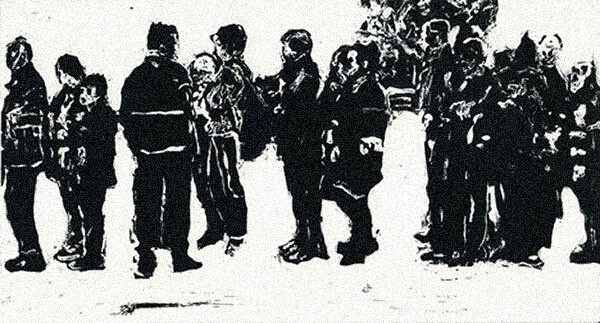

Chaos
“I hide myself back here to view them from above on the balustrade, while they wander around in the hall between 11:30 and 11:45. Like terrified gazelles they remain in unstable equilibrium leaning their chests over slightly and supporting their chins with their hands and looking off into the distance where there is nothing to look at that I can see.
They speak very little. But sometimes they speak in a frozen, refined language, as though they were knights from some age of crystal. They emit rapid sounds of rebuke, they warn each other of danger. I don’t think they think of themselves as young humans. In fact, to be precise, I don’t think they think of themselves at all. They don’t think, their gaze rests on unrecognizable objects, and they compose elaborate sequences of functional gestures. The word is detached from the affectionate heat of bodies, so their bodies no longer know how to speak of themselves, and their words regress to abstract digits or guttural gestures.
Let me say even more. Erotic seduction is progressively disconnecting from sexual contact, and becoming purely aesthetic solicitation. The perfection of the frozen dance, the implacable automatism.”
Professor Forza’s words had such magnetic intensity that Alex, listening, had the feeling of being lifted up. He spoke with refined proficiency, even if the sentences that he was constructing had no meaning at all.
They speak very little. But sometimes they speak in a frozen, refined language, as though they were knights from some age of crystal. They emit rapid sounds of rebuke, they warn each other of danger. I don’t think they think of themselves as young humans. In fact, to be precise, I don’t think they think of themselves at all. They don’t think, their gaze rests on unrecognizable objects, and they compose elaborate sequences of functional gestures. The word is detached from the affectionate heat of bodies, so their bodies no longer know how to speak of themselves, and their words regress to abstract digits or guttural gestures.
Let me say even more. Erotic seduction is progressively disconnecting from sexual contact, and becoming purely aesthetic solicitation. The perfection of the frozen dance, the implacable automatism.”
Professor Forza’s words had such magnetic intensity that Alex, listening, had the feeling of being lifted up. He spoke with refined proficiency, even if the sentences that he was constructing had no meaning at all.
Flottements
Luca in the hospital. Immobile on his comatose meditations.
What matters is to eat and excrete. Dish and pot, dish and pot, these are the poles.3
What if I ended it? If I decided right now to end it? Not to continue to get it over with, to finish again and again and not ever finish with the end—this ending that doesn’t want to end. End in the true sense of the word or the untrue sense of the word. There wouldn’t be any more words—just think—!not even “end.”
Because of me, innocents have been slaughtered even if I couldn’t prevent it and to tell the truth I haven’t decided a damn thing. My life happened to me and that’s it. And the lives of others happened to them without my being able to do anything about it.
… flottements, the coherence gone to pieces, the continuity bitched to hell because the units of continuity have abdicated their unity, they have gone multiple, they fall apart.4 I squatted in the dark.
Whose are the voices speaking in my head?


[…]
I don’t know what I’m talking about I just need to talk. To not end or for to end yet again. This is what I’ve done so far, it’s the only thing I know how to do. I’m speaking now of me: yes, henceforward I shall speak of none but me, that’s decided, even though I should not succeed.5 Yes, my resolutions are remarkable in this, that no sooner are they formed than something always happens to prevent their execution.6 I fail like no other dares fail. I won’t speak of myself simply because I don’t know what “myself” means. I watched people for hours. Sitting on a bench or on the ground leaning against a post, I listen to the conversations of others or I invent them based on a sign, a smile. I don’t even know what I’m doing in this piazza thick with anemic mumbling existences. With this book of photographs in my hand. These fragments of a frozen time when light is reduced to pure geometry. A spindly child with bony legs like long sticks of wood. And in the background the black sea, the white sand, and all the rest is gray. The voices of the fishermen, the fish traps lined up, and the nets. Nets of memories, of silence, at times tattered, at times patched with unexpected connections and what the alcohol and the acid suggest, delivering words to you picked clean, in their natural whiteness. Words. Mother-water that generates life. Perhaps I overindulge in them. I use them as pillars to prop up my past and my future, to keep them from crumbling on top of me. This is why I invent stories. I know that sooner or later words will betray me. I can feel it. They will escape. Then I will be pushed back into primordial silence, an uninhabitable silence in which I will lose myself …
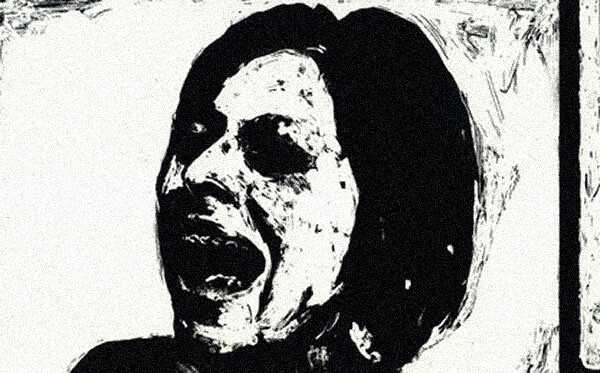

On the Bridge
The staff in the Scientific Department managed to decipher the words written on Federica’s note with great difficulty, and only in part.
Just a year ago I didn’t know you existed, and now your existence bursts out of every nook and cranny … I believed you, Luca. I loved you. But it wasn’t enough. I wasn’t happy. And I don’t think you were, either (if my opinion still matters to you at all). I wasn’t tidy. I was out of focus. Chott el Djerid. A portrait of light and heat.
What I remember of our nights together is unzipping and zipping back up and getting stuck, ripped clothing and asking and giving amid too much logic.
That night I asked you things I’d never ask you again: “What do you want from me?” I was confused. You confused me. You laughed and said, “Nothing, you know… really, nothing.” Nothing, nothing, nothing… Me? Want something from you? Obsessing, I loved you for that nothing.
But there was still something I needed to know. Something of myself that I needed to discover. A buried clod that you could not break apart. This is why I had to leave, yelling at you that the Laws of Correspondences are bogus, that we can’t all live inside a metric grid with all the accents in the proper place, that numbers don’t explain everything. I tried to slip into silence. Into inner stillness. I tried to pull myself up by my hair and rip my own head off. To stick a hand down my throat and pull my stomach out. To never stop screaming against this incoherence. I needed wrinkled surfaces that go numb, organic matter that sticks to you, that makes you feel like you have a skin, that you are a goddamn skin!
The endless expanses of pure logic you disclosed at the start scared me. This dazzling ice that cannot be walked on. I needed Hell then. That’s where I needed to go to find myself. Grab my own arm and wrench myself out of this life.
My body was so demanding it walked out on me. Before that you were still here, my love. So, I followed the man who bought my soul… What were we, Luca, if not this shortness of breath, this mosaic of disappearances and reappearances, an endless sowing of little signals so as not to lose ourselves entirely?
I am with you my love only with you forever with you wherever with you but not with you, only with you, without anything, nothing else.
Fiat Lux
They set Isidoro’s body down on a white shroud under a surgical light to wait for Doctor Sibelius to finish his intense consultation. The old professor was not yet entirely dead, but his eyes seemed to be oblivious of everything in this world. Only that ring of light invaded his perception. The blinding lamp above him shone through the forests of neurovisual receptors and excited the impressionable spirit that was slowly making its way up the Eternal Steps. And now he remembered and whispered:
There in Heaven, a lamp shines in whose light
the Creator is made visible to His creature,
whose one peace lies in having Him in sight.That lamp forms an enormous circle, such
that its circumference, fitted to the Sun
as a bright belt, would be too large by much.7
He sighed.
His eyes, invaded by the infinite brilliant shimmer, saw that Paradise was opening before him. In his ears, regular breathing and distant death rattles, faint voices, unintelligible words.
Advancing to the highest point, towards the still center, he recited to himself in a low voice:
Experiencing that Radiance, the spirit
is so indrawn it is impossible
even to think of ever turning from It.For the good which is the will’s ultimate object
is all subsumed in It; and, being removed,
all is defective which in It is perfect.8
Doctor Sibelius decided there was no urgent need to operate. He turned towards the nurse at his side who was watching Isidoro’s lips move, and asked her, “Why should we inflict a postponement on this man, my dear Milena?”
The nurse replied, grimly, “It’s terrible how stubbornly the soul wraps around the body.”
Doctor Sibelius nodded his head in agreement, and reflected for a moment. Then he replied, pensively, “The blind persistence with which the soul refuses to pull away … its infantile fear of solitude, and perhaps the terror of the cold beyond the atmosphere. The attachment to the horror of this life is incomprehensible—the unbridled need to be something instead of nothing.”
Isidoro only heard distant whispers. Celestial choirs. And he continued to see the staircase of light.
As one who sees in dreams and wakes to find
the emotional impression of his vision
still powerful while its parts fade from his mind—just such am I, having lost nearly all
the vision itself, while in my heart I feel
the sweetness of it yet distill and fall.9
Doctor Sibelius seemed surprised. “This man is speaking!”
“He’s not speaking, he’s whispering,” Milena corrected him. “Can you understand what he’s saying?”
Sibelius moved his ear closer to listen.
Nor were my eyes confounded by that sea
and altitude of space, but took in all,
number and quality, of that ecstasy.10
“He’s reciting lines from Dante’s Paradiso,” said Sibelius, standing back up and tugging his goatee.
“Whatever happened to Purgatory?” asked Isidoro in a small voice, mistaking Doctor Sibelius for the Eternal Father.
“You must have mistaken me for someone else,” replied Sibelius, barely stifling a laugh. He continued, abruptly, “I’m not a guardian angel from on high.”
Isidoro seemed not to understand.
Doctor Sibelius moved away, followed by Milena who impatiently walked into a private room. She rolled back the left sleeve of her smock and snapped her tourniquet.
Isidoro then saw a scene unfold through his mental fog.
Lucifer approached the throne and challenged the Creator. “You programmed an error. It’s my job to free the world from the effects of the Head Programmer’s schizophrenia.”
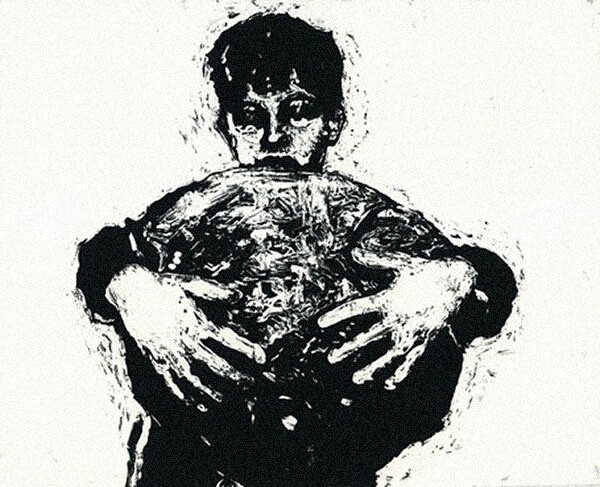

The Creator turned his blinding gaze towards him, full of hatred. He could see the future and he could see the inevitable. He saw his children weeping as they moved away from the Garden. He saw the temptress, he saw the serpent. He saw heaps of corpses blackened by smoke and incandescent pincers harpooning the flesh of the suffering. And all of this was his own gift, offered to the innocent, unreasonably called forth from the belly of nothingness.
Lucifer courteously pointed that out, because Lucifer was no idiot. He was a gentleman with good manners. The slobbering Old Man was aware of His incontinence, and of His nightly, guilty, libidinous, nocturnal emission that turned against Him, baring His teeth.
Blood on His teeth, like Goya’s Saturn, mauling flesh with his teeth.
“That’s what you know how to do, you know how to maul,” said Lucifer, the beautiful prince, laughing.
And the Old Man flung the prince of nothing headlong into the distance with an all-powerful gesture.
And then He asked him, as though he needed to apologize for all the programming mistakes, “Isn’t the author perhaps an element of the code which he can’t escape from? Isn’t the code, then, the real culprit in all this?”
Isidoro opened his eyes, and dissolved in his mind the vision of the Creator punished by Lucifer. Then he recited his last words, which, as usual, were not his own.
Within the depthless deep and clear existence
of that abyss of light three circles shown -
three in color, one in circumference;the second from the first, rainbow from rainbow;
the third, an exhalation of pure fire
equally breathed forth by the other two.But oh how much my words miss my conception,
which is itself so far from what I saw
than to call it feeble would be rank deception!11
Then his lips became immobile and quiet.
The spirits in the room craved nothingness, that beneficent atheist divinity, to whom even the god Time bows down. And nothingness reached them.
God said: Fiat Lux.12 And darkness appeared. Forever.
In the meantime, the Creator took the form of a spider and hurried to string its spittle from one beam to another of Luca’s attic.
Satisfied, the repugnant spider scurries to the center of the room, having done its work. The attic, illuminated by the first rays of dawn, is now a forest of slobbery threads. There are excited footsteps down below. Someone is pushing in the door. It is Alex, who has reached Luca’s address, after reading his revealing letter addressed to Professor Vitale.
The slobbering spider is excited. The throbbing beast weaves forever and ever.
Ghost Track
A deserted place: full moon, dilapidated building. Ruins of a partially uncovered prison cell with bars on the tiny window. A shred of moon slithers across the wall, vibrating with the rapid passage of clouds. There is a clanking of chains. A man appears, walking with a solemn gait on unstable legs that look to have been immobile for centuries. His wrists are bound in irons. In front of him, pulling him by a chain, is a young woman with a red hoodie over her shoulders. The hood conceals part of her hair. Other than this, she is nude. Her body is entirely covered in a thin layer of what looks like white clay, which is slightly cracked. They pass through a network of tunnels. From darkness to semi-darkness to the moonlight that bursts forth through a breach in the wall.
They pass the entrance to the cell, which is missing a door. The woman accompanies him to a wall and unchains him. Hanging from the wall is a violin bow of unusual design. Worn out by time and use, the bow swings in the wind sending forth flashes of moon.
In one of the corners opposite the entrance, a second man, an enormous one, is sitting on a small stool facing the wall. He is semi-nude, covered with a heavy layer of white greasepaint. On his tattooed back is a dark green spider with eight hooked legs. The man sets a large metal pail on the floor, which he had been holding in midair, as though he had just finished drinking the contents.
On the bottom of the pail are four short metal posts, like chair legs.
The prisoner takes the bow and moves to the center of the cell. Flecks and smears of dried blood are all around the peg from which the bow hung.
Between the squeaking and puffing of compressed air, the limbs of the pail are set in motion, and it moves towards the prisoner, stopping in front of him. He takes the bow and gets ready to play. In place of the usual horsehair are blood-stained metal fibers.
There is a rubbing of strings that vibrate with difficulty. The melody is plaintive and sweet, heart-rending and unsettling.
Sprays of red hit the man’s clothes and face. More blood drips into the pail.
Now we see the violin. It is the very arm of the violinist. The strings are veins, tense and throbbing. The expression on his face is engrossed, concentrated so as not to feel the pain.
The music becomes more violent, the sound deeper. Serious. A vein-string breaks with a dull, watery snap. A slight grimace of pain on the violinist’s face does not interrupt the performance.
Blood sprays more quickly, reaching the back of the fat man who is almost immobile. A slight shiver shakes him from neck to buttocks.
We see the contents of the pail. A dark red abyss only slightly agitated by widening jagged circles.
Another vein bursts. The music drags on towards the end, frenzied.
Blood pours into the pail.
A third vein blows. Now the piece is being played on a single string. The highest one.
Translator’s note: Shiro Kuramata, Miss Blanche Chair (1988), paper flowers, acrylic resin, and aluminum.
Translator’s note: A group of designers specializing in the use of plastic materials.
Translator’s note: This is a reference to Samuel Beckett, Malone Dies (Grove Press, 2006), 179.
Translator’s note: This is a reference to Samuel Beckett, Disjecta: Miscellaneous Writings and a Dramatic Fragment (Grove Press, 1984), 49.
Translator’s note: This is a reference to Samuel Beckett, Three Novels: Molloy, Malone Dies, The Unnamable (Grove Press, 2009), 392.
Translator’s note: This paraphrases Beckett, Three Novels, 27.
Dante, The Paradiso, trans. John Ciardi (Penguin), lines 100–105.
Dante, The Paradiso, lines 100–105.
Dante, The Paradiso, lines 58–63.
Dante, The Paradiso, lines 118–20.
Dante, The Paradiso, lines 115-23.
Translator’s note: From the Latin “Let there be light.”
Category
Subject
Excerpted from Morte ai Vecchi (Baldini & Castoldi, 2016). This excerpt is translated from the Italian by Deborah Wassertzug. Illustrations commissioned by the authors. All illustrations by Flavio Marziano, unless otherwise noted.
